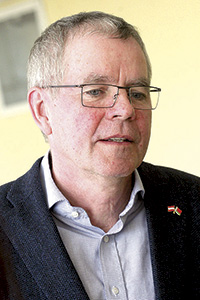
One of the largest projects being implemented in Belarus with Austrian capital is the BelToll automated fair collection
Path should continue
Austria’s mutual relations with Belarus combine economic co-operation with respect for traditions and culture. The Republic of Austria is the largest investor into our country, having brought between $500,000 and $1m into the Belarusian treasury over the past decade. Moreover, the Austrian-Belarusian Society, founded at the initiative of Professor Peter Bachmeier, has been operational for a decade, contributing greatly to public dialogue.
In April, Austria opened a full embassy in Minsk, showing its desire to further intensify communications. The Ambassador of Austria, H.E. Mr. Bernd Alexander Bayerl, cannot hide his optimism, saying, “We are neighbours not only with the EU but with Belarus. We can co-operate in all spheres, including economics and politics. This year, Austria plans to host the Days of Belarusian Culture, with the participation of our presidents. What else can we wish for to ensure a better future?”
In fact, there is a great deal to aspire to, especially considering the modern crises which have emerged in Europe. Communications between East and West Europe are suffering, notes Professor Dieter Segert, of Vienna University’s Institute of Political Sciences. Speaking of the modern situation in Europe, he tells us, “One of the deepest crises following the cold war is developing in Europe. The main task we face is to establish co-operation in a new way, between the East and the West of Europe. Europe comprises more than just the European Union, having its own spiritual and cultural identity. Sadly, the European crisis is, in many respects, a crisis of relations between Russia and the West, tackling issues beyond security. Ukrainian events have become an important component of the European crisis. In my view, Ukraine should have played an intermediary role between the West and the East, being equally close to both sides. However, the ruling class of Ukraine has chosen to move exclusively towards the West, to the detriment of the country and its surrounding partners. Relations with Belarus have begun to build against this background but our path has just begun and needs to be continued.”
Professor Peter Bachmeier is convinced that there is an alternative. Addressing students at the Belarusian State University’s International Relations Faculty, he stressed, “We believe an alternative exists to splitting Europe: a decentralised, social Europe of free nations in co-operation with Russia, Belarus and other Eastern European states.”

Bernd Alexander Bayerl
| 
Dieter Segert
| 
Peter Bachmeier
| 
David Stockinger
|
Vienna universities
The slogan of ‘Europe of Nations’ or ‘Europe of Homelands’ is becoming increasingly popular in the European Union, where a dialogue of cultures and nations is viewed as an alternative of Homo economicus and domination of trans-national companies.
The Chairman of Schwechat’s Office of the Social Democratic Party, David Stockinger, is among those European politicians who view the TTIP (Transatlantic Trade and Investment Partnership) as a threat, as it brings dictatorship of corporations — primarily American — to Europe. Delivering a speech in Minsk, he urged the building of a large Europe, restoring co-operation between our people and our countries on a new basis.
Professor Segert believes that the influence of national states from one side and the decline of European institutes from another side will rise. The victory of candidates of the right during recent Austrian presidential elections and the growing influence of the National Front in France could become a new European alternative. “I believe in the EU as a community and as a project of human development but not as a rigid model imposing rules on other people and governments,” Mr. Segert noted.
Truly, it seems that the more serious the challenges and the more uncertain the future, the more active the steps that should be taken to establish bridges. Of course, relations between Vienna and Minsk won’t replace those of Minsk and Brussels. The European Union speaks with a single voice. However, is this voice as strong as it once was, or has the migratory crisis weakened the EU’s unity? Under the present crisis, we need to offer new paths of co-operation. Nobody can better formulate the reasons as to why the EU is valuable to Belarus and what Belarus can offer to Europe than Belarus itself.
On counter courses
As regards relations between Belarus and Austria, experts speaking at the BSU’s conference noted that our countries enjoy many common features. Associate Professor Vladislav Froltsov believes that Belarus and Austria — owing to their geographical situation — have historical experience of establishing relations both with the West and with the East. Our countries are comparable in terms of population and both have socially oriented economies, pursuing a multi-vector policy. Vienna is a headquarters of many international organisations, while Minsk is now claiming status as a capital of peacemaking and integration — though on a minor scale. Importantly, both Austria and Belarus pursue their foreign policy through dialogue with partners and search for common ground.
Austria is among Belarus’ five major investors, playing an important role in modernisation of the energy system, machine building, woodworking and construction. Austrian equipment and technologies play a large role in modernising our industry.
As Mr. Bachmeier stressed, Belarus is now viewed as a bastion of traditional European culture. All that is needed now is to remove obstacles to our trade and interaction. Sincere and friendly conversation in Minsk with guests from Vienna is a step in the right direction to mutual understanding.
By Nina Romanova
Photo: Alexander STADUB; BelTA
Photo: Alexander STADUB; BelTA











